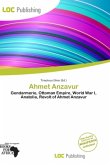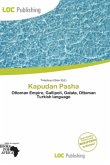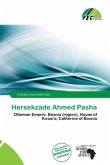Please note that the content of this book primarily consists of articles available from Wikipedia or other free sources online. Hezarpare Ahmet Pasha (also called Tezkireci Ahmet Pasha) was an 17th century Ottoman grand vizier. He was a son of a professional soldier of probably Greek origin. But he chose bureaucracy. He was appointed to several posts one of which was the personal secretarial (tezkireci) of the grand vizier Kemanke Mustafa Pasha. (He gained the epithet tezkireci after this appointment) In 1646, two years after Mustafa Pasha's execution he was appointed as the defterdar and in 1647 he was promoted to the rank of grand vizier, the highest post in Ottoman bureaucracy. Sultan brahim (sometimes called mad) was a rather unbalanced sultan. He was an addict of sable skin coats. He forced his grand vizier to buy huge quantities of sable skin for his palaces. Ahmet Pasha concentrated more on sable trade than state affairs. During his term the Venetian navy blocked the strait of Çanakkale (Dardanelles) and the important fort of Klis (in modern Croatia) was lost to Venice. (see Cretan War (1645-1669)) Moreover, large scale sable skin purchase caused in extra budget deficit which was already under the pressure of the war.
Bitte wählen Sie Ihr Anliegen aus.
Rechnungen
Retourenschein anfordern
Bestellstatus
Storno








